A Q&A with Anthropology’s Wesley D. Stoner
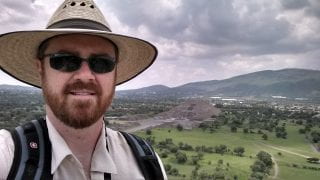 Wesley D. Stoner, Ph.D.
Wesley D. Stoner, Ph.D.
Associate Professor,
Department of Anthropology in the Fulbright College of Arts and Sciences
In this conversation, Stoner talks about how his road to a career in archeology has included studying everything from chemical engineering to psychology; how interdisciplinary education is key to flexibility of thought and innovation; his passion for teaching and guiding students to educate themselves; his love for research, his family and playing the drums; and how sometimes imaginary conversations with dogs can provide some of life’s greatest laughs.
Additionally, learn more about how Stoner is leading a research team studying ancient agriculture in south-central Veracruz, Mexico thanks to a recent $250,000 NSF grant! This team aims to gain insights into modern farming and the potential impacts of climate change on this coastal region.
Q: Tell us a little about your research, academic passions and/or role within the college. What excites you about this?
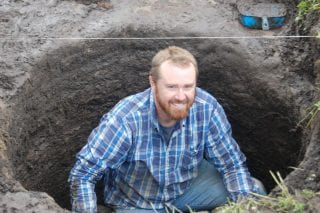 I am an archaeologist, but my road to archaeology has taken many turns. I began my undergraduate career in chemical engineering, but my mind kept moving toward more social questions.
I am an archaeologist, but my road to archaeology has taken many turns. I began my undergraduate career in chemical engineering, but my mind kept moving toward more social questions.
Social psychology was a natural shift for me by my sophomore year. Social relationships of inequality and the formation of ingroups vs. outgroups seemed imperative to understand our modern world and the environment in which I grew up.
Anthropology had always been among my course enrollments each semester at Penn State, but I didn’t make it my major until my junior year. Thanks to a few influential professors, I felt that anthropology, specifically archaeology, was a good fit and would allow me to explore virtually any question that interested me.
The turns I took on the way to becoming an archaeologist continued to influence my research. Early in my graduate career at the University of Kentucky, I developed an interest in the role of exchange systems in the evolution of societies over long periods (hundreds and thousands of years).
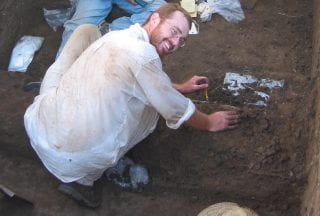 Exchange is hard to see in the archaeological record without written documents, so I developed a specialty in geochemical sourcing. My early years as a chemical engineering student paid off!
Exchange is hard to see in the archaeological record without written documents, so I developed a specialty in geochemical sourcing. My early years as a chemical engineering student paid off!
Sourcing methods in archaeology seek to obtain a chemical or mineral composition for an artifact in order to trace it back to the place of production or raw material source. In doing so, the processes that brought that artifact (stone tools, ceramic pots, glass beads, metal pendants, etc.) from the source to its resting place where archaeologists discovered it represent either commodity exchanges or the movement of people.
I’ve applied these techniques particularly to ceramics in North America, Mesoamerica (Mexico, Guatemala, and Honduras), and South America. Before I came to the U of A, I held a postdoctoral fellowship at the University of Missouri Research Reactor (a nuclear reactor with a world-renowned archaeometry lab) that drew me into collaborations with researchers at dozens of institutions.
More recently, I have turned to a new research question: the role of intensified agriculture in the evolution of complex societies.
Satellite and LiDAR remote sensing have identified 15,000 square kilometers of raised fields interspersed among low-density cities along the Gulf Coast of Mexico, Veracruz. Raised fields – digging a network of canals and piling the sediment onto planting platforms – take advantage of wetland environments that would be inundated for part of the year and converts them into fertile fields capable of year-round cultivation.
Through research funded by the NSF and other sources, I am leading a team of researchers from the U of A, Universidad Veracruzana, University of California-Santa Barbara, University of Tennessee-Knoxville, and Arizona State University.
We will investigate the timings of the settlement history, architectural constructions, and investments in raised field agriculture in the Gulf lowlands from 1500 B.C. through A.D. 900 when the political systems in the region ultimately collapsed.
Q: How long have you been at Fulbright College? What have you enjoyed most about your time here?
I have been in Fulbright College since fall 2014. I came in as an assistant professor and recently attained tenure in early 2020. The campus and surrounding region are beautiful: I enjoy walking across campus to get to classes, particularly the view from the top of the hill to around the Union across the valley to the southwest.
Fulbright College is unique among all of the other universities where I’ve spent time. The combination of humanities, social sciences, and natural sciences facilitates some interesting interdepartmental interactions that are fundamental to the ideal holistic education in the U.S.
Interdisciplinary education is key, in my mind, to flexibility of thought and innovation.
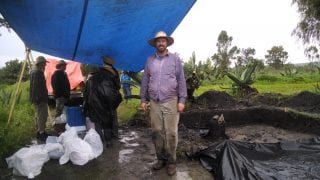 Q: What do you most hope your students remember from their classes and/or interactions with you?
Q: What do you most hope your students remember from their classes and/or interactions with you?
Like my own life experience, our students were all raised with in specific social and cultural contexts that represent a limited range of human experiences across the world. It is my hope that exposing students to the tremendous diversity of human organization and thought, not only across space but also over time, will help them make sense of their own worlds.
More than the specific topics and cultures I feature in lectures and discussions, students should be able to apply the patterns and processes of the past to the present. The study of the past is and always will be situated in present social and political contexts.
I see my role as a guide to open doors to explore various topics. The most rewarding interactions I have had are with students who choose to step through those doors and independently educate themselves using the conceptual tools developed in class or who have shown self-reflexive critical thinking applied to situations in their own lives.
For those students who will never think about archaeology again, I hope I at least provided a little entertainment for our semester together.
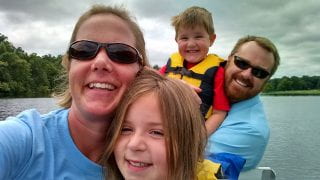 Q: What do you like to do during your time outside of the university?
Q: What do you like to do during your time outside of the university?
At times I feel as though I don’t have time outside of the university, but I really enjoy conducting research. If I enjoy it, it can’t be work, right?
Working with data and seeing patterns, and then expressing those interpretations in writing, are some of the most rewarding ways to spend my time. It’s why I pursued academics.
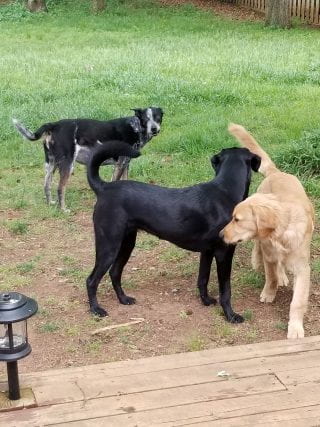 When I can put work aside, I do whatever I can to manage stress. I have played drums my whole life, and even made drums and cymbals at one point.I try to spend time with my wife and two children. And, we have three dogs that provide an endless source of humorous situations for the family. We often act out conversations that we imagine the dogs have with each other and us: each dog has its own voice and personality, of course.
When I can put work aside, I do whatever I can to manage stress. I have played drums my whole life, and even made drums and cymbals at one point.I try to spend time with my wife and two children. And, we have three dogs that provide an endless source of humorous situations for the family. We often act out conversations that we imagine the dogs have with each other and us: each dog has its own voice and personality, of course.
Q: What’s up next on the horizon for you?
My research touches upon social interactions, religion, art, architecture, agriculture, materiality, urbanism, economic trade, and other things.
I have collaborated with some other departments on campus to develop research projects, but there are many more interdisciplinary relationships that I would like to develop (if you are reading this, let’s talk!)
I am increasingly focused on environmental questions and soil science. As described above, my summers will be spent (COVID pending) in Veracruz over the next several years where I hope to develop a new direction for future research projects that may keep me busy for the rest of my career.
Q: Is there anything else you’d like to add or let readers know?
Yes. To students, don’t get locked into a narrow focus on your discipline of study.
Chemists and physicists, for example, can learn a lot from the humanities. My own research shows that social sciences and humanities can likewise integrate and benefit from the natural sciences.
Economics, marketing, and business are fundamentally social disciplines that integrate sociology, anthropology, and psychology. Everyone can benefit from English, math, and statistics.
Learn a foreign language. The breadth of education is the benefit of the four-year degree in the U.S. compared to many other nations.
If you find yourself pulled in multiple disciplines, like I did, a major in anthropology or dual major with another department might be the solution allowing you to dabble in virtually everything that interests you. This is not an advertisement; I am speaking from experience.

